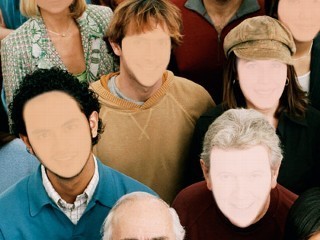當(dāng)前位置: Language Tips> 流行新詞
分享到
身邊有這么一些人,看見(jiàn)熟人都會(huì)張口喊一句“那誰(shuí)!”然后盯著人家半天叫不出名字。這世界上還有那么一些人,他們無(wú)法辨認(rèn)別人的容貌,就算是每天相見(jiàn)的熟人,他們也認(rèn)不出來(lái)。如果說(shuō)前者是一時(shí)語(yǔ)塞,后者卻是實(shí)實(shí)在在的一種病癥。

Face blindness refers to difficulty recognizing faces or telling faces apart.
臉盲癥(face blindness)指難以辨認(rèn)或分別人的容貌的狀況。
New findings from researchers at Harvard and elsewhere suggest that a surprising number of people are face-blind, so bad at recognizing faces that they routinely snub acquaintances and have trouble following movie plots. In extreme cases, they may greet siblings as strangers and struggle to discern which child is theirs at school pick-up time.
來(lái)自哈佛及其他地方的研究人員發(fā)現(xiàn),有相當(dāng)一部分人都患有臉盲癥,而且這個(gè)數(shù)目是驚人的。這些人完全無(wú)法辨識(shí)臉部容貌,以至于經(jīng)常對(duì)熟人視而不見(jiàn),看電影時(shí)也跟不上情節(jié)。在一些極端案例中,他們會(huì)把自己的兄弟姐妹誤當(dāng)成陌生人,到學(xué)校接孩子時(shí)經(jīng)常無(wú)法判斷哪個(gè)孩子才是自己家的。
The syndrome, known medically as prosopagnosia, was long thought to be a rare neurological curiosity that resulted from brain damage.
這種綜合征的醫(yī)學(xué)學(xué)名為prosopagnosia,長(zhǎng)期以來(lái)一直被看作是罕見(jiàn)的神經(jīng)科奇癥,且由腦損傷引起。
Research has begun to suggest that most face-blindness stems from genes, rather than brain injury, and that it is far more widespread than previously suspected, with up to 2 percent of the population affected to some degree.
不過(guò),有研究顯示,大部分臉盲癥不是腦損傷引起的,而是由基因?qū)е碌模涣硗猓浒l(fā)病規(guī)模也遠(yuǎn)遠(yuǎn)超出之前的預(yù)測(cè),全球人口中有2%的人都患有不同程度的臉盲癥。
相關(guān)閱讀
(中國(guó)日?qǐng)?bào)網(wǎng)英語(yǔ)點(diǎn)津 Helen)
點(diǎn)擊查看更多英語(yǔ)習(xí)語(yǔ)和新詞
分享到
關(guān)注和訂閱


口語(yǔ)
關(guān)于我們 | 聯(lián)系方式 | 招聘信息
電話:8610-84883645
傳真:8610-84883500
Email: languagetips@chinadaily.com.cn